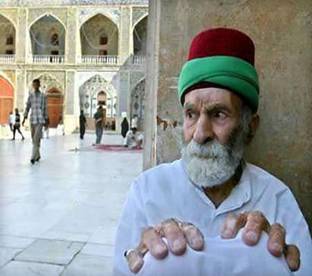|
|
US troops Trap Najaf Holy Shrine, Sistani Tells Iraqis to March to Save the City
By Yahoo News
August 25, 2004

Photo by Chris Helgren/Reuters
Najaf, Iraq, (AFP) -- US armoured vehicles trapped Najaf's Imam Ali shrine in a pincer grip, smashing through Shiite militiamen defences as snipers fired on all those coming or going from the mausoleum.
A US plane fired a missile just metres (yards) to the west of the mausoleum, making the building tremble and filling it with dust, said an AFP correspondent inside with up to 600 other people.
The closest US vehicle was 20 metres (yards) from the western gate of the complex, for four months the military headquarters of radical cleric Moqtada Sadr's Mehdi Army, after troops closed in from the Najaf sea, a desert surrounding the city.
Makeshift barricades set up to protect the entrance were torched as tanks moved along the western side of the compound wall towards the surrounding Old City.
To the east, US forces had smashed through militia defences in the marketplace in Midan square while the heavy boom of artillery fire thundered out across the area from the southern side.
The situation on the northern side, closest to the city's vast cemetery, was not immediately clear but the southern and northern exits from the shrine were in the sights of snipers, preventing anyone from entering or leaving.
The shrine -- one of the holiest Shiite pilgrimage sites in the world -- was very close to being sealed off from the rest of the city, the AFP correspondent said.
Hundreds of heavily-armed Iraqi national guardsmen, who were deployed in the Old City for the first time Tuesday, continued to patrol the streets and alleyways about 300 metres away.
US fire pummelled all main roads leading from the gates into the Old City and only a few dared venture out, sprinting for their lives to collect basic necessities such as bread.
A doctor at the shrine's small clinic said 10 people had been brought in wounded overnight, but suspected there were many others who had been stranded on the battlefield or taken elsewhere.
Elsewhere an aide to Iraq top Shiite Muslim cleric, Grand Ayatollah Ali al-Sistani, said the cleric was returning home from London after treatment for a heart condition and had called on Iraqis to march on Najaf to save the city,
"Ayatollah Sistani is going to return in a few hours to the homeland to save Najaf ... We call on all Iraqis ... to prepare to march on Najaf," aide Hamad al-Khaffaf told Al-Arabiya TV Wednesday from London.
Shiite Muslim militiamen besieged inside the Imam Ali shrine closed all four doors of the compound, said an AFP correspondent.
The compound wall has four gates. The main entrance and exit point in the south was bolted at midday. The three others were closed earlier.
Inside about 150 militiamen and "human shields" who flocked to the shrine in recent weeks to support Sadr, demonstrated, holding little pieces of cardboard scrawled with slogans.
"The Americans and (Iraqi Prime Minister Iyad) Allawi will never get rid of Sadr the Iraqi because he is defended by honest people." "We demand Allawi the butcher resign" and "Where is the freedom you promised America?" they said.
On the white marble floor next to them lay the body of a Mehdi Army fighter killed in the market place beyond the walls of the complex.
US Sergeant Trevor Candelan said heavy tank and machine-gun fire began at around 6:30 am and was aimed at Mehdi Army positions on Medina Street, which runs parallel to the mausoleum.
It had been a largely peaceful night with no major incidents but the marines had "shelled reasonably during the night on Medina Street," he added, saying there had been "not much firing from the enemy side".
The US military said Iraqi security forces, supported by the marines, conducted overnight operations and that all air raids Tuesday night had been "defensive in nature".
"If Moqtada Sadr surrenders, he will be safe and sound. If he resists, the only thing for him is death or prison," Defence Minister Hazem al-Shaalan told the television cameras Tuesday.
"A large Iraqi force will near the mausoleum, waiting for the signal for the assault, unless they surrender. There are only a few hours left," said Shaalan.
Elsewhere US planes and tanks pounded suspected insurgent positions in the flashpoint city of Fallujah, west of Baghdad, early Wednesday, the US military said.
A spokesman said the operation began first thing in the morning.
"We've got some strikes against anti-Iraqi force positions in the city using tanks and aircraft... We have hit some positions," Lieutenant Colonel T.V. Johnson told AFP.
He refused to confirm whether the operations were still ongoing and said he had no information about casualties on the ground.
Shortly after midnight on Tuesday, US planes bombed a suspected foreign fighters' hide-out near Fallujah, in a raid sanctioned by Iraqi prime minister Iyad Allawi.
In the last two months the US military has conducted several air strikes in the Sunni Muslim bastion, where US troops have faced some of the toughest resistance to their continued presence in Iraq.
|
|



